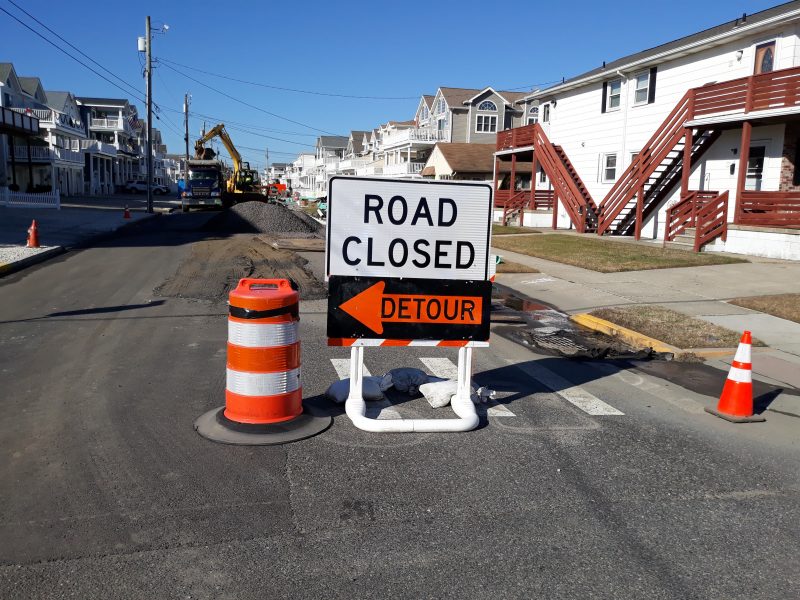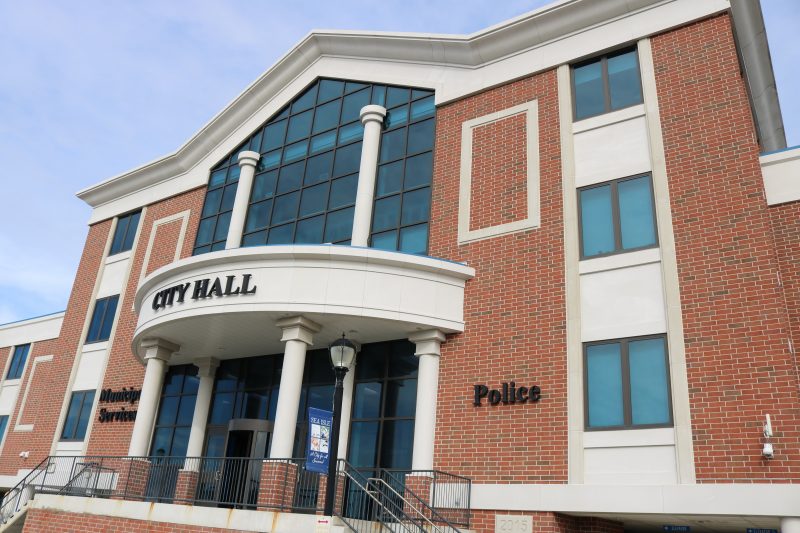Motorists may encounter "Road Closed" signs like this one during construction projects throughout Sea Isle this fall.
 By DONALD WITTKOWSKI
In a cost-cutting move, Sea Isle City may end the practice of having police officers provide traffic control at construction projects on local roads unless it is absolutely necessary for safety.
Police officers are occasionally assigned to direct traffic at Sea Isle road projects that are done by the city’s outside contractors. City Solicitor Paul Baldini said it is known as “extra duty.”
The issue was brought up during Tuesday’s City Council meeting, prompting a discussion whether police officers truly are needed for traffic control at most road construction sites, especially during the quiet off-season months.
“We have a town of 1,500 people and it’s not that busy. In the summertime, I understand, because we have more safety issues,” Councilwoman Mary Tighe said, comparing the volume of traffic between the slow winter months and the busy summer tourism season.
Tighe said having police direct traffic at construction sites is an added cost to taxpayers because contractors include that expense in their bids for city projects.
“We did not want that to cost our taxpayers more money, because what happens is, it goes into bid packages and we bid it out and we’re still paying for that,” Tighe said.
Councilman Frank Edwardi suggested that perhaps the cost for police traffic control could be eliminated from the bids. Instead, the contractors could assume the cost of traffic control entirely on their own, saving taxpayers money, Edwardi said.
Baldini told the Council members that Mayor Leonard Desiderio’s administration has been monitoring the costs of having police officers assigned for traffic control. He indicated that the administration will give Council a report on those costs.
By DONALD WITTKOWSKI
In a cost-cutting move, Sea Isle City may end the practice of having police officers provide traffic control at construction projects on local roads unless it is absolutely necessary for safety.
Police officers are occasionally assigned to direct traffic at Sea Isle road projects that are done by the city’s outside contractors. City Solicitor Paul Baldini said it is known as “extra duty.”
The issue was brought up during Tuesday’s City Council meeting, prompting a discussion whether police officers truly are needed for traffic control at most road construction sites, especially during the quiet off-season months.
“We have a town of 1,500 people and it’s not that busy. In the summertime, I understand, because we have more safety issues,” Councilwoman Mary Tighe said, comparing the volume of traffic between the slow winter months and the busy summer tourism season.
Tighe said having police direct traffic at construction sites is an added cost to taxpayers because contractors include that expense in their bids for city projects.
“We did not want that to cost our taxpayers more money, because what happens is, it goes into bid packages and we bid it out and we’re still paying for that,” Tighe said.
Councilman Frank Edwardi suggested that perhaps the cost for police traffic control could be eliminated from the bids. Instead, the contractors could assume the cost of traffic control entirely on their own, saving taxpayers money, Edwardi said.
Baldini told the Council members that Mayor Leonard Desiderio’s administration has been monitoring the costs of having police officers assigned for traffic control. He indicated that the administration will give Council a report on those costs.
 City Council is expected to consider a new ordinance to pull back on having police perform traffic control at construction sites unless absolutely necessary for safety.
Tighe said she noticed that police were providing traffic control recently at two or three construction sites, including on Landis Avenue and Central Avenues, even though traffic volume is light at this time of year.
“We’ve been having work done that’s extended into Central Avenue, into Landis Avenue and we’re blocking it off. We’re putting cop cars there. We’re putting police sitting there all day,” Tighe said.
Council President J.B. Feeley asked Baldini whether the officers are handling traffic control during their off-duty hours. Baldini responded by calling it “extra duty.”
“They’re on duty, but they’re not on scheduled duty,” Baldini said of the officers. “In other words, they’re still our officers, they’re not privately hired. We assign them to that position and then the city charges the developers $60 an hour for an administrative cost.”
Baldini said police officers are not paid overtime for directing traffic. He also said that officers assigned to traffic control would be pulled off to respond to an emergency if there was one.
Police Chief Tom McQuillen declined to comment on the issue.
If Council repeals the old ordinance that allows police officers to perform traffic control at road projects, the city is expected to use more barriers and “Road Closed” signs to direct motorists around work sites. Baldini said that is something that other towns often do.
City Council is expected to consider a new ordinance to pull back on having police perform traffic control at construction sites unless absolutely necessary for safety.
Tighe said she noticed that police were providing traffic control recently at two or three construction sites, including on Landis Avenue and Central Avenues, even though traffic volume is light at this time of year.
“We’ve been having work done that’s extended into Central Avenue, into Landis Avenue and we’re blocking it off. We’re putting cop cars there. We’re putting police sitting there all day,” Tighe said.
Council President J.B. Feeley asked Baldini whether the officers are handling traffic control during their off-duty hours. Baldini responded by calling it “extra duty.”
“They’re on duty, but they’re not on scheduled duty,” Baldini said of the officers. “In other words, they’re still our officers, they’re not privately hired. We assign them to that position and then the city charges the developers $60 an hour for an administrative cost.”
Baldini said police officers are not paid overtime for directing traffic. He also said that officers assigned to traffic control would be pulled off to respond to an emergency if there was one.
Police Chief Tom McQuillen declined to comment on the issue.
If Council repeals the old ordinance that allows police officers to perform traffic control at road projects, the city is expected to use more barriers and “Road Closed” signs to direct motorists around work sites. Baldini said that is something that other towns often do.